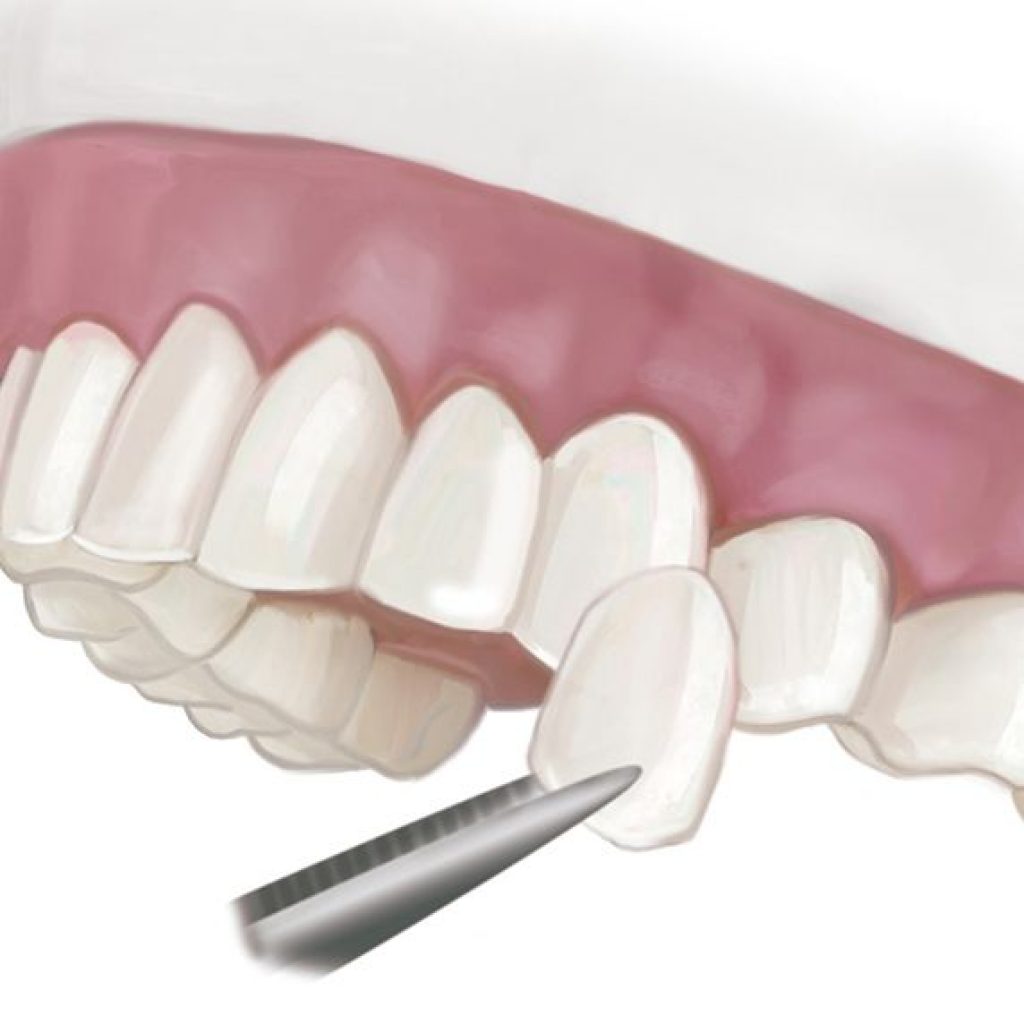
Cosmetic dentistry as an industry has evolved a lot over the last two decades. Even if you have had cosmetic dental work done in the last couple of years, you might have a question about a new treatment or procedure you just recently heard about. I would say one of the most frequently asked questions we receive from patients in our office is… “Do cosmetic veneers damage your teeth?”
Porcelain veneers believe it or not do ruin or damage your teeth. Our cosmetic dentists here at San Marcos Dental Center, take a lot of pride in equipping each patient with the information or knowledge needed to create the best treatment plan.
What are cosmetic veneers?
Before discussing the specific details of how custom veneers can affect your health long-term or other teeth. We thought it might be helpful to first have a concept or grasp of what custom veneers are. Cosmetic veneers are simply just thin pieces of porcelain that are custom shaped to go over the front of our existing teeth. We can shape or color the veneers and tailor them according to your specifications and the desired result. Custom veneers are not full proof and need to typically be replaced every ten years with a new set. The feeling of a perfect smile is priceless as a patient, with pearly white teeth that are functional and designed to last.
How do custom veneers affect your teeth?
Custom veneers will not hurt or damage in any way as long as you see a qualified or licensed dentist. The first step of the process is to take a few initial x-rays to examine how healthy your teeth are and to evaluate potential signs of decay. In most cases, we will have to treat your teeth before we begin your treatment. Once your teeth and gums are healthy, we will need to prep your teeth. To prep your custom veneers we start the whole process by removing a thin layer of your existing enamel from your teeth. Although this might sound barbaric or painful it’s not, because we will be bonding the veneers over your teeth. Your teeth will now have more protection than ever before and will not be susceptible to staining, unlike natural teeth. From there we add a special bonding cement to bond the veneers to your existing teeth. The bonding materials used are completely safe and will not damage your teeth. This rather simple dental procedure will give you a long-lasting and beautiful smile while protecting your teeth from stains.
Over the next decade, you will enjoy your new smile! Eventually, you will have to replace them with a new set to keep them looking amazing but regardless you have a solution that won’t hurt or damage your teeth! Your teeth will stay intact and safe under the protected custom veneers.
If you have any questions on custom veneers please contact San Marcos Dental Center today at 760.734.4311 to schedule a free consultation 🙂
What Are the Advantages of Dental Implants?
There are many advantages to dental implants, including:
*Enhanced aesthetics – Dental implants look and feel like your own natural teeth. And it is because they are designed to fuse with bone, and then they become permanent.
*Better speech – With poor-fitting dentures, the teeth can slip within the mouth causing you to mumble or slur your words. Dental implants allow you to speak without the worry that teeth might slip.
*Boost comfort – Because they become part of you, implants eliminate the discomfort of removable dentures.
*Trouble free eating – Sliding dentures can make chewing difficult. Dental implants function like your own teeth, allowing you to eat your favorite foods with confidence and without pain.
*Raise your self-esteem – Dental implants can give you back your smile and help you feel better about yourself.
*Upgrade your oral health – Dental implants don’t require reducing other teeth, as a tooth-supported bridge does. Because nearby teeth are not altered to support the implant, more of your own teeth are left intact, improving long-term oral health. Individual implants also allow easier access between teeth, improving oral hygiene.
*Longevity – Dental implants are very durable and will last many years. With good care, many implants last a lifetime.
*Reassurance – Removable dentures are just that; removable. Dental implants eliminate the embarrassing inconvenience of removing dentures, as well as the need for messy adhesives to keep them in place.
Dental implant technology has become the state-of-the-art tooth replacement solution because of its advantages over earlier treatments. And, with modern innovations in dentistry, most patients can benefit from them – even those who were formerly told they could not.San Marcos Dental Center offers a free consultation to see if dental implant procedure is right for you!

9 tips on maintaining your cosmetic veneers
Cosmetic veneers can completely overhaul your smile’s appearance by addressing flaws in your smile and making dental imperfections a distant memory. With proper care and maintenance, cosmetic veneers can last well over a decade before they need to be replaced.
The Longevity of Cosmetic Veneers
The average lifespan of a cosmetic veneers is roughly about ten years. With proper care and maintenance, that time frame can be lengthened, and your veneers may last you up to 20 years. Having cosmetic veneers applied the first time properly will save you time and money in the future. Make sure to wrk with a cosmetic dentist that you trust to ensure that your smile looks fantastic from the start.
Prolonging the Lifetime of Veneers
Despite best efforts, if you do not take proper care of your teeth, your dental veneers will not last for as long as they should. To help keep your investment looking spectacular for as long as possible, follow these tips:
Don’t Use Your Teeth As Tools
Do not attempt to open things with your teeth, or bite on non-food items such as pen caps or fingernails. Doing so can lead to veneers that end up chipping or cracking from pressure.
Avoid Tobacco Products
Tobacco products are known to stain your teeth, and veneers are no exception. Avoid tobacco products to keep your sparkling white veneers from turning yellow.
Avoid Dark-Colored Foods and Beverages
Red pasta sauce, berries, soft drinks, coffee, tea, and wine are all commonly known offenders for leaving behind surface stains on your teeth. Moderation is the key to keeping your smile bright, and rinsing your mouth with water after indulging in dark-colored foods and beverages is always recommended.
Floss Daily
Teeth that are covered with veneers still require daily flossing. Routine flossing helps to keep your gums in great shape and can protect against gum disease, which can create unwanted gaps between your gums and your veneers.
Wear a Mouthguard
Whether you’re an active sports player or a habitual teeth grinder at night, wearing a dental guard can help to prevent the erosion of the porcelain in your veneers. Dental guards are a great way to help keep your veneers in great shape.
Use the Right Oral Hygiene Tools
A soft-bristled toothbrush and non-abrasive toothpaste will help to clean your veneers gently without wearing away the porcelain. Use the right oral hygiene tools to clean your veneers, and they will be much more likely to last.
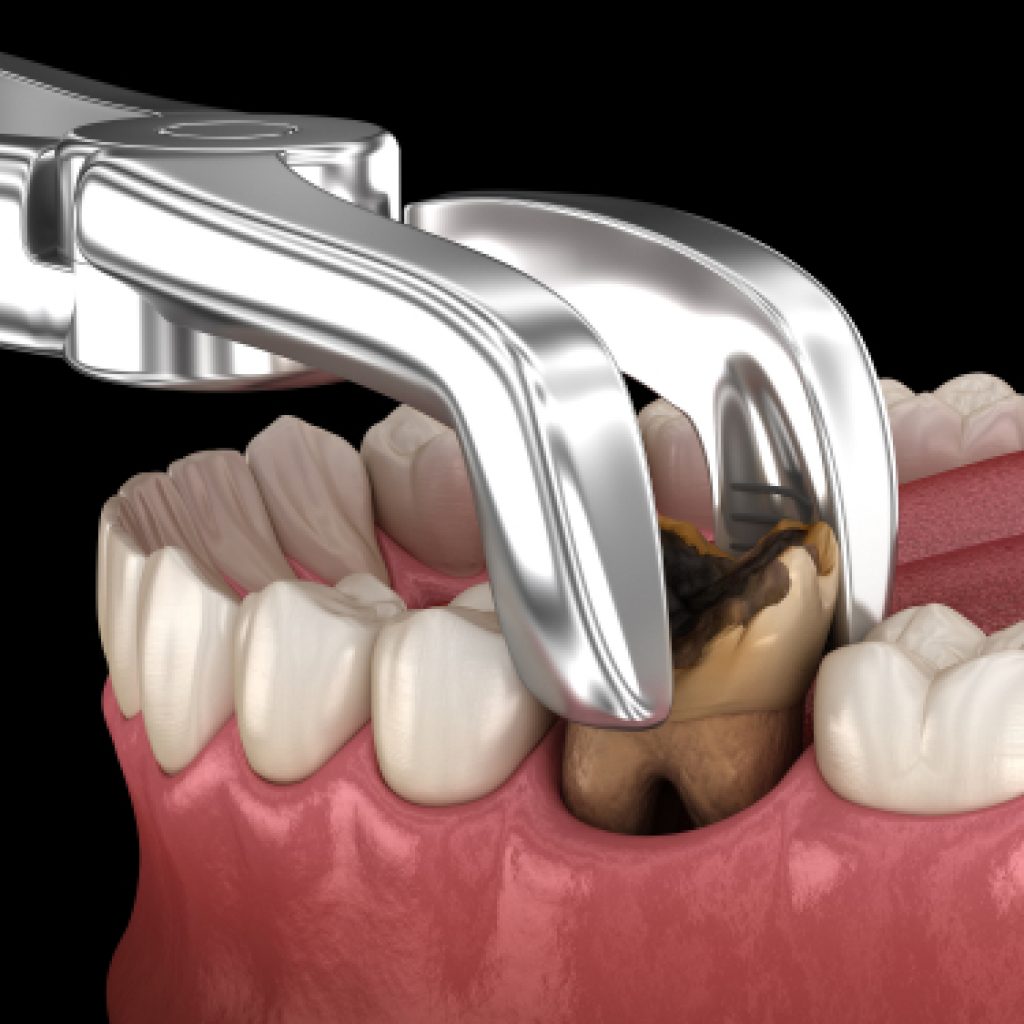
Five Side Effects Of Tooth Extractions
San Marcos Dental Center works hard to provide patients with excellent, comprehensive dental and surgical care. Many patients are referred to our office because their family dentist has told them they need a particular procedure like a tooth extraction. In dental care, tooth extractions are a last resort. Dentists will do everything in their power to save a tooth before resorting to tooth extraction, but sometimes it is necessary to keep other teeth and gums healthy. Prior to any tooth extraction, San Marcos Dental Center will discuss the procedure, the post-op care, and the six most common side effects.
1. Bleeding
After a dental extraction bleeding will occur, but it’s important to form a blood clot to stop the bleeding. Prior to leaving the appointment, we will ask you to bite on a gauze pad for 30-45 minutes. If the bleeding continues after this, you should insert another gauze pad and bite firmly for another 30 minutes. This process may have to be repeated several times to form a blood clot.
2. Swelling
Extracting a tooth normally causes a minor amount of swelling in the mouth and cheek. Typically, the swelling occurs the day after the extraction occurred. You can minimize the swelling with ice packs.
3. Moderate Pain
It is normal to feel a mild or moderate amount of pain after tooth extraction. You can take over-the-counter pain medication like paracetamol or ibuprofen. Please follow the directions on the container closely and do not exceed the daily amount. If the pain persists or becomes worse, please call our staff.
4. Soreness
A dental extraction can cause minor pain and a tender mouth, that’s why it’s beneficial to eat a soft diet after the procedure. Our office highly recommends consuming foods like soup, smoothies, scrambled eggs, mashed potatoes, soft vegetables, yogurt, and pasta.
5. Rinse
After the procedure, it is important to keep your mouth clean to avoid any type of infection. On the day of the procedure, you can gently brush your teeth.The day after the procedure, you should rinse your mouth with warm water and a teaspoon of salt or a prescribed antiseptic mouthwash 5-6 times per day. This will help your mouth heal and avoid any unnecessary infection.
Are dental implants painful to get?
Having surgery can be frightening because some part of your body has to be operated on. Since getting dental implants means your jaw has to be cut, it makes sense that a lot of people are apprehensive about the procedure and the amount of pain it will cause.
How painful is the procedure?
One of the biggest motives people believe dental implant surgery is painful is because of what they see on the internet. A quick search for dental implant surgery will net you plenty of pictures or people getting holes drilled into their gums, which looks quite scary if you do not know what is going on. However, there is no reason to worry because the procedure itself is not as painful as it looks.
Let us use a scale of one to ten, with one representing minimal discomfort and ten representing excruciating pain. A straightforward dental implant, for a patient with good bones and who does not need a lot of soft tissue surgery, has a pain level between two and three in the first 24 to 48 hours, which means over-the-counter medication like Tylenol or Advil will take care of any discomfort they are feeling.
The pain that patients feel when they get dental implant surgery is actually not from the hole made in the bone or the placement of the implant — the pain usually comes from the soft tissue manipulation that occurs during the process.
With that in mind, dental implants that do not require lifting the gum tissue are actually painless, with patients reporting pain levels of one to two after the procedure. If a small flap of gum tissue is lifted, the pain level is at three or four for the first night and subsides after that.
If the bone has to be grafted for the procedure, the pain level is higher and patients are at a 5 five or six in terms of the pain they experience for the first three days after the procedure, which will require giving them a strong pain reliever.
Regardless of how much gum tissue is lifted or if grafting is required, the pain lasts anywhere from one to three days and subsides after that.
Another factor in the amount of pain experienced is the patient’s individual threshold for pain. Some people can endure more pain than others, which means even if two different people get the same procedure, their levels of pain will be different.
After your dental implant procedure
After the procedure, you will have difficulty eating regular food as your gums heal, which means you will need to eat soft foods for a while. You will also need to avoid caffeine and tobacco products to prevent implant failure and other complications.
You will need to schedule frequent appointments with your dentist so they can make sure you are healing properly and there are no complications from the procedure.
Do cosmetic veneers ruin your real teeth?
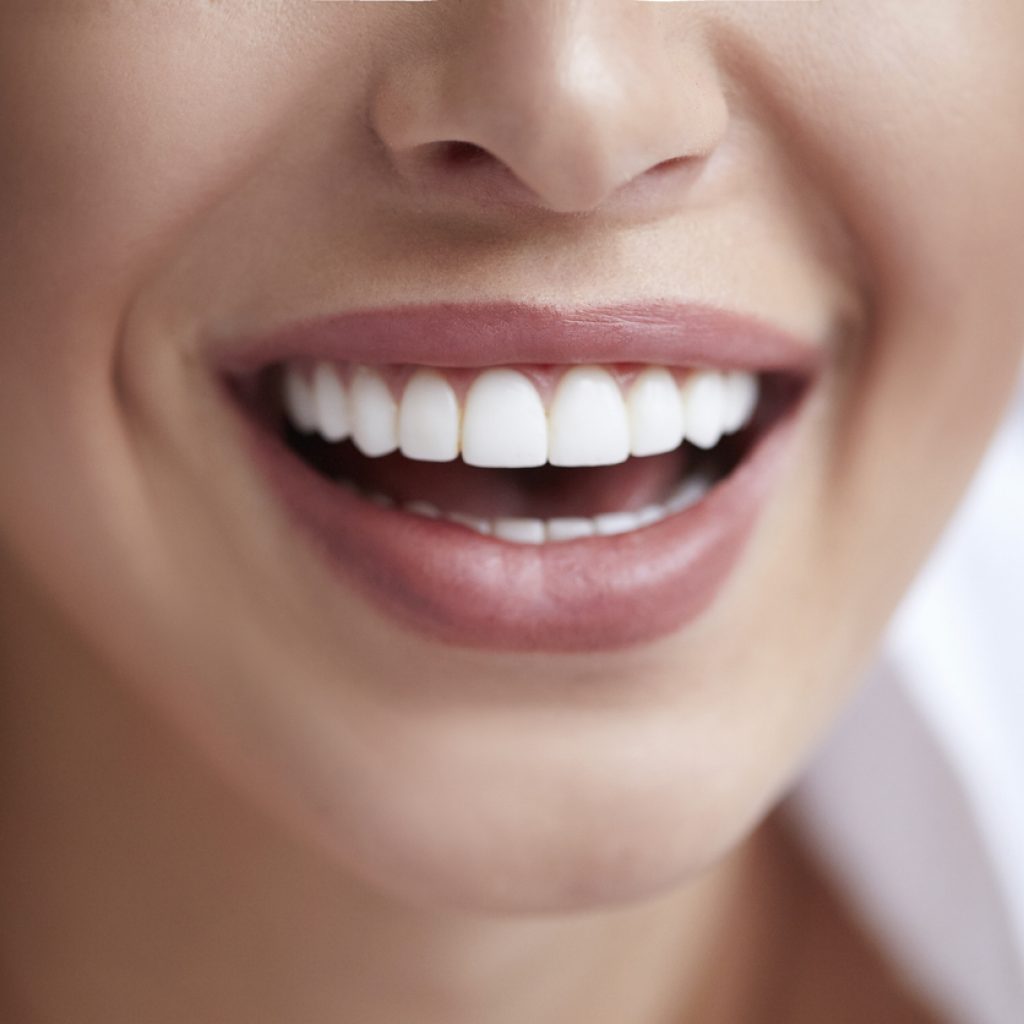
On the contrary the answer is a firm no, cosmetic veneers do not ruin your natural teeth! In fact, they are designed to fit over your teeth and enhance their naturally beautiful appearance. The first step to understanding that veneers do not hurt or ruin your real teeth is to understand how they work. When you meet with one of our cosmetic dentists for porcelain veneers, we have your veneers custom designed to fit your exact smile. Whether you are in for one veneer or for your whole smile, your new veneers are designed and fabricated for a custom, perfect fit. Veneers are attached to your natural teeth with a special material that hardens under a certain type of light. After they are bonded to your teeth, they are shaped and polished by our cosmetic dentist until they are absolutely perfect!
So now that we’ve discussed how cosmetic veneers work, let’s talk about how they affect your teeth. First off, the material that is used to bond them to your teeth is not harmful to your natural teeth. This means that having the veneers attached does not ruin or hurt your teeth. Secondly, porcelain veneers are not made of enamel like the front of your natural teeth. This actually gives you some benefits. The main advantage is that they do not stain like your normal teeth would. Bring on the coffee and dark liquids, you can’t stain your new porcelain veneers! They are also incredibly hard, making them more resistant to damage than your natural teeth. All that goes to say that no, veneers do not ruin your real teeth! In fact, they actually have the advantage over natural teeth in terms of resistance to damage or staining.
So, you think you may be interested in cosmetic veneers? Naturally, the next question many of our patients have is: how much do porcelain veneers cost? Well, the cost of porcelain veneers is really very dependent on your specific situation. We wish we could provide an easy, guaranteed answer to that question, but it really is necessary to have one of our cosmetic dentists evaluate you for porcelain veneers to determine a cost. Cost varies based on the state of your teeth, your jaw, and how many veneers you are interested in. Depending on your insurance provider, you may be able to pay for some of the procedures through insurance. Some patients choose to place veneers on all their teeth. Others prefer to only place veneers on the top teeth. Some only want cosmetic veneers on the 6 or 8 teeth that really show when they smile. No matter how many veneers you are interested in, or if you only want to learn more, some see us at Lane and Associates! One of our dentists will evaluate you to determine if you are eligible to receive veneers, and will discuss the cost of the procedure at that time.
5 tips to a speedy recovery after a tooth extraction:
1. Eat a Soft Food Diet
A nutrient-rich diet provides after a tooth extraction your body with the vitamins and minerals it needs to promote cell renewal and wound healing. However, it is vital to avoid hard, crunchy, or chewy foods during your recovery to minimize irritation to the empty tooth socket.
Eating a soft food diet allows you to get the nutrition you need without damaging the soft tissue around your surgical site. For the first few days following your procedure, fruit smoothies, lukewarm blended soup or broth, yogurt, oatmeal, scrambled eggs, mashed avocado, and soft fish, like tilapia or Alaskan Pollock are excellent and nutritious options.
2. Avoid Using a Straw or Smoking
Drinking through a straw or smoking creates negative pressure in your mouth, which can dislodge the blood clot that forms in the tooth’s socket. If the blood clot is dislodged, you are at risk of developing a painful condition called a dry socket can lead to severe infections, deteriorate jaw bone, and damage nerves.
3. Cold Therapy
Post-surgical swelling can last for up to a week after your tooth extraction, peaking around day three. Excessive swelling can hinder the healing process, extending your recovery time.
Manage swelling by applying a cold pack to the affected side of your face intermittently for 15 minutes at a time. The cold not only slows blood flow to decrease swelling, but it also numbs the area, reducing your discomfort. Cold therapy is typically only effective for the first 48 hours after surgery.
4. Use Over-the-Counter Medications
Once the anesthesia from the extraction wears off, you may feel some discomfort at the surgical site. While the discomfort should pass after several days, you can manage painful symptoms with over-the-counter anti-inflammatory medications.
Do not use medications for more than three days consecutively, and take the dosage recommended by the manufacturer. If the pain persists, it may be a symptom of an underlying issue, such as an infection or dry socket, and you should contact your dentist immediately.
5. Maintain Good Oral Hygiene
Although you can’t brush or floss the extraction site for one to two days after the procedure, you can remove food debris and prevent infection by rinsing with a salt water solution made with a teaspoon of table salt dissolved in a cup of warm water. Gently swish the solution in your mouth morning, evening, and after eating.
Continue to brush and floss your remaining teeth twice per day. But avoid rinsing with alcohol-based mouthwashes to prevent irritation to the tooth socket.
Dental Implants: How Long Do They Last?
Dental implants are considered to be one of the best options for tooth replacement. A dental implant can replace a single tooth or act as an anchor for a bridge or dentures. There are many advantages of dental implants, including their longevity. Implants are the longest lasting tooth replacement option available. How long do dental implants last? Here’s what you can expect.
Dental Implants Can Last a Lifetime
The average lifespan of a dental implant is anywhere from 10 -30 years. This means that most likely, depending on your age when you get an implant, it will last for the rest of your life. No other tooth replacement option has the ability to last that long. When you get a dental implant, you are making an investment in your dental health for your lifetime.
Why Do Dental Implants Last So Long?
What is it about dental implants that make them last? Why do they outlast other tooth replacement options?
It’s because of their design.
A dental implant is an artificial tooth and root system. It consists of an implant root, an abutment, and a crown. The implant root is a titanium post with threads (ridges) like a screw. The implant root is surgically placed in the jaw bone. Titanium is a biocompatible material that will fuse with the bone through a process called osseointegration. This process takes a few months, but once a solid bond is formed, it can last for many years.
The Crown May Not Last as Long
A few months after your implant root is placed and has had time to fully bond with the bone, an abutment and crown can be attached. The abutment is just a post that extends from the root up through the gums for the crown to attach to. The crown is typically made of porcelain, which is durable and resembles natural tooth enamel.
While the implant root can last many years, the crown portion of your dental implant may not. The crown may only last 10-15 years before it will need to be replaced due to typical wear and tear. It may last longer for some, but this is the average timeframe. The cost of the crown is much less than the cost of the whole dental implant, so replacing the crown once or maybe twice in your lifetime isn’t too significant.
What Can I Do to Make My Dental Implant Last Longer?
For a dental implant to last for many years, it does take some basic maintenance on your part. For example:
- Brush and floss your teeth. Keep up with good dental hygiene habits. Brush your teeth twice a day and floss once a day. This is recommended for all people, not just those with dental implants. But taking care of your teeth is important for maintaining your dental implant. While your dental implant is not susceptible to decay, preserving your other teeth and your gum health which directly supports it.
- Go to the dentist every 6 months. Routine dental appointments are also important for helping your implant last. Keeping your teeth clean and your gums healthy will help your implant stay solidly in place. These exams also identify any potential issues that could jeopardize your implant, such as gum disease.
- Avoid smoking. Smoking is one of the biggest detriments to the health of your dental implant. It restricts the blood flow in vessels in the gums which can affect the healing process as well as osseointegration, so your implant may never solidify.
- Live a healthy lifestyle. Keeping yourself healthy is an important part of your dental health as well. Bone health is key, because if your bones weaken your jaw may not be able to support your implant as well as your other teeth. Take vitamins and supplements, especially calcium and potassium for bone health, with approval from your doctor.
Four fun facts about cosmetic veneers
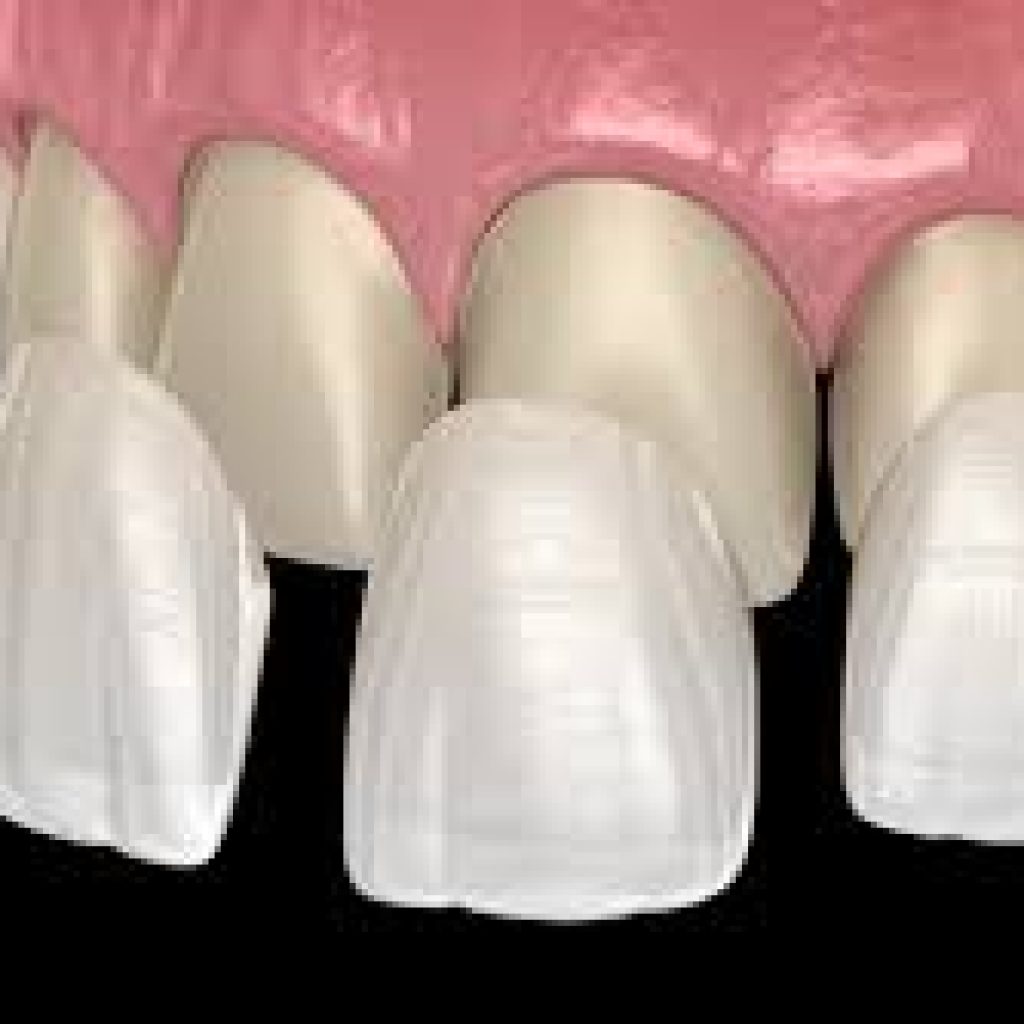
Are you thinking of getting cosmetic veneers to improve the look of your natural smile? Before making your dental decision, check out these fun four facts.
- Lessens tooth sensitivity
In addition to making teeth look brighter and more beautiful, cosmetic dentistry veneers can also make teeth less sensitive and stronger. According to dental care Detroit experts, cosmetic dentistry veneers can significantly reduce tooth sensitivity because they cover the front of teeth to provide a barrier against the foods and drinks that make them feel very sensitive. - Doesn’t damage your enamel
Thanks to advances in dentistry, veneers no longer always require extensive enamel removal. Your veneer dentist may actually be able to place your veneers with little to no dental damage. - Contour and reshape your face
One of the greatest advantages of cosmetic dentistry veneers is how they can change the entire shape of your face. Based on your dental needs and desires, your veneer dentist can place veneers to do a serious makeover to widen your smile, accentuate your cheekbones, or make your face more symmetrical.
Last a lifetime!
While veneers may cost more than cosmetic dental bonding, they also last much longer. With proper care and cleaning, cosmetic dentistry veneers can continue looking great for up to 20 years. And unlike cosmetic dental bonding, which can stain over time, veneers are stain-resistant to keep your smile white and bright for a very long time.
Tooth Extraction: Recovery & Aftercare

When you’ve had a tooth removed or extracted, you need to take heightened measures to care for your mouth. Doing specific habits even on the first day, may help you feel better and speed up the recovery process faster.
Limit Bleeding
To help control bleeding, bite firmly on the gauze placed by your dentist. The pressure helps to form a blood clot in the tooth socket. If you have a lot of bleeding, bite on a regular tea bag. The tannic acid in the tea aids in forming a blood clot. Bite on the gauze or the tea bag until the bleeding stops. Slight oozing of blood on the first day is normal.
Minimize pain
To lessen any pain, take prescribed medicine as directed. Don’t drive while taking any pain medicine as you may feel drowsy. Ask your dentist if you may take over-the-counter medicine, if needed.
Reduce swelling
To reduce swelling, put an ice pack on your cheek near the extraction site. You can make an ice pack by putting ice in a plastic bag and wrapping it in a thin towel. Apply the ice pack to your cheek for 10 minutes. Then remove it for 5 minutes. Repeat as needed. You may see some bruising on your face. This is normal and will go away on its own.
Get enough rest
Limit activities for the first 24 hours after an extraction. Rest during the day and go to bed early. When lying down, raise (elevate) your head slightly.
Do’s
Below are some things to do to help your mouth heal.
- Do eat a diet of soft, healthy foods and snacks. Also drink plenty of liquids.
- Do brush your teeth gently. Avoid brushing around the extraction. And don’t use any toothpaste. Rinsing toothpaste from your mouth may dislodge the blood clot.
- Do keep the extraction site clean. After 12 hours you may be able to gently rinse your mouth. Rinse 4 times a day with 1 teaspoon of salt in a glass of water. Check with your dentist first.
Don’ts
Below are some things to avoid while you’re healing.
- Don’t drink with a straw. Sucking on a straw may dislodge the blood clot.
- Don’t drink hot liquids. Hot liquids may increase swelling. Limit your alcohol use. Excessive use of alcohol may slow healing.
- Don’t smoke. Smoking may break down the blood clot. This can cause a painful tooth socket.
Caution: Rinse your mouth very gently. Otherwise the blood clot may be dislodged.
Call your dentist
Get in touch with your dentist if you have any of the following:
- Pain becomes more severe the day after your extraction.
- Bleeding becomes hard to control.
- Swelling around the extraction site worsens.
- Itching or rashes occur after you take medicine.
ADVANCES IN DENTAL IMPLANT TECH FOR 2022
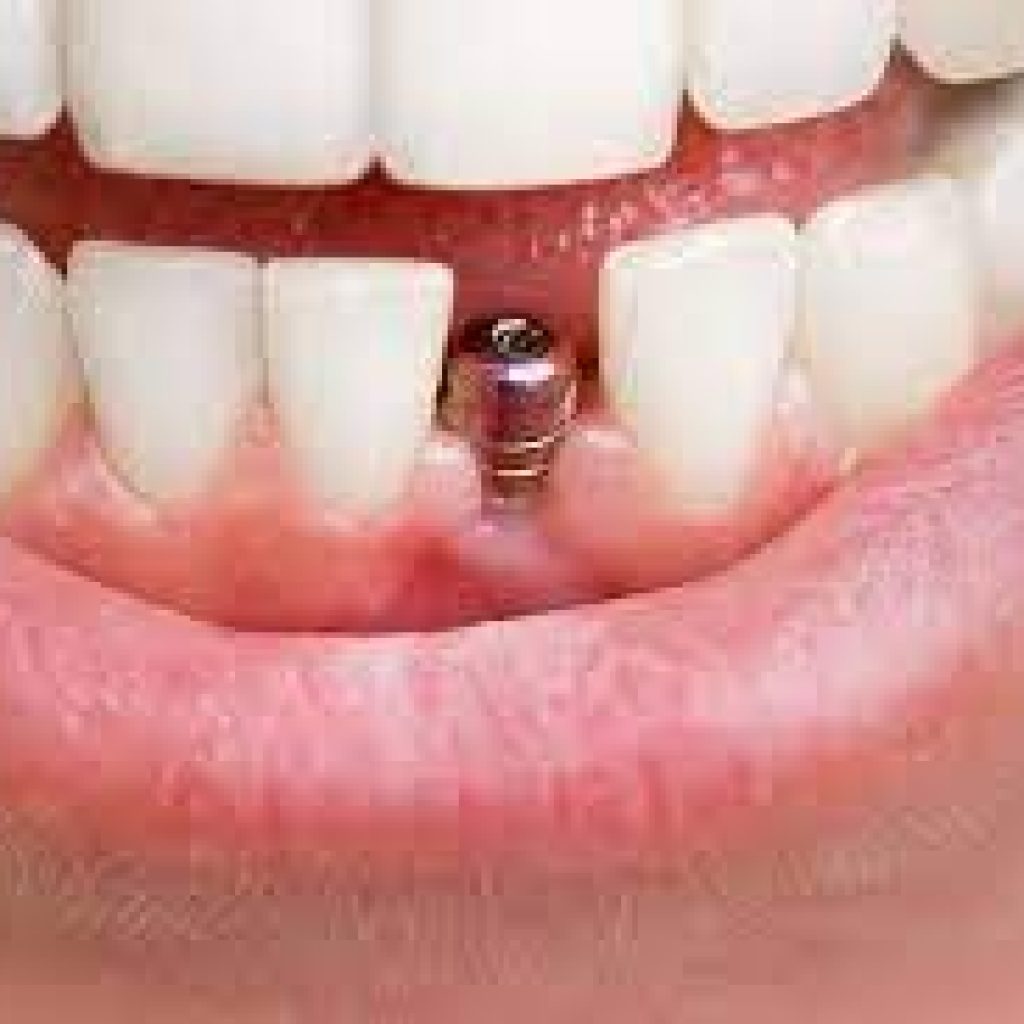
Using the most recent advances in dental implant technology. Some offices offer same day dental implants that do not require a second procedure to uncover them but do require a minimum of six weeks of healing time before placing artificial teeth on them. There are even scenarios where the dental implants can be placed at the same time as a tooth extraction further decreasing the number of surgical procedures. Advances in dental implant technology have made it practical in select cases, to extract teeth, and place implants with crowns at one visit. This process is called immediate loading which makes the surgical process go seamless and leads to faster recovery times. We use all the latest cutting-edge dental implant technology to accurately determine the quantity and quality of your bone and plan precisely where to place the implant. This also means we get a precise and highly detailed 3D image which leads to safer, more predictable implant placement and a more aesthetically pleasing outcome. Our philosophy of continual investment in new technology and training means we’re confident in providing the very highest quality care which is reflected in our high dental implant success rates and excellent patient outcomes and post-care patient feedback.
TYPES OF IMPLANTS OR CROWNS
A single prosthesis or crown is used to replace one missing tooth, each prosthetic tooth attaches to its own dental implant. A partial prosthesis fixed bridge can replace two or more teeth and may require only two or three implants. A complete dental prosthesis fixed bridge replaces all the teeth in your upper or lower jaw. The number of implants varies depending upon which type of complete prosthesis (removable or fixed) is recommended. A removable prosthesis (over denture) attaches to a bar or ball in socket attachments, whereas a fixed one is permanent and removable only by the dentist.Patients who’ve chosen to have dental implants nearly always tell us they wished they’d had the treatment earlier. Losing teeth can seriously impact quality of life and even have a negative impact on mental health. Put simply, Dental Implants are a pathway to renewed self-confidence and peace of mind.
DENTAL IMPLANTS VS DENTURES?
In short, Dental Implants are the best we have right now. Dentures represent an older, less effective technology and have negative attributes such as; loose fits, slippage and the need to remove at night. Once Dental Implants are placed the best thing that can be said is you’ll forget about them. What price can you put on peace of mind?
AM I A CANDIDATE FOR DENTAL IMPLANTS?
If you’re considering implants, your mouth must be examined thoroughly and your medical and dental history reviewed. If your mouth is not ideal for implants, we may recommend ways to improve outcomes, such as bone grafting.
